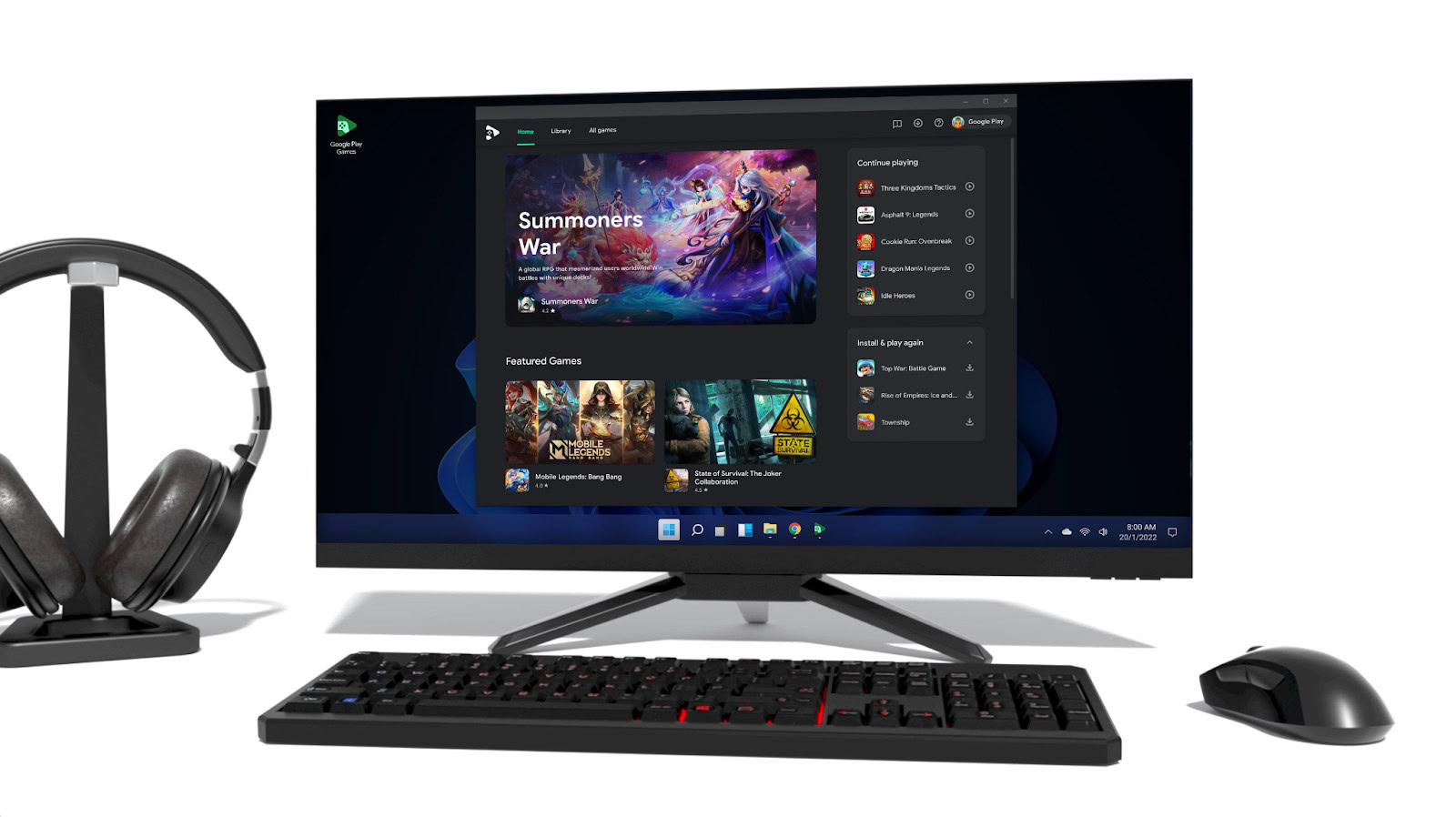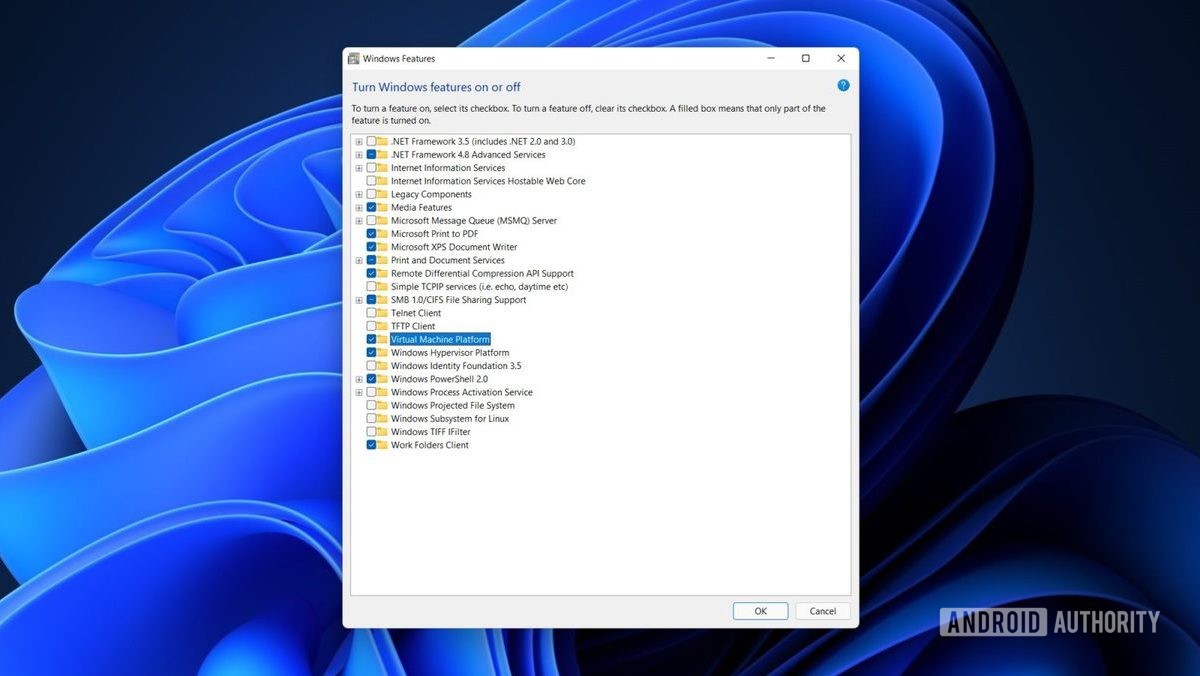Affiliate links on Android Authority may earn us a commission. Learn more.
How to run Android apps on Windows 11: Official and APK methods

Out of the box, your Windows 11 computer does not have the capability to install Android apps and games. And even though Microsoft once offered the Windows Subsystem for Android as an official way to run Android apps, that’s no longer the case these days. The company sunset the feature in March 2024, with support only guaranteed for existing users for the next year.
With that in mind, here’s how to run Android apps on your Windows PC — we’ll cover both official and unofficial options.
QUICK ANSWER
If you only care about running Android games on Windows 11, you can use Google's Play Games beta for PC. It's the only official solution left now that Microsoft has sunset its native Android app support for Windows 11. As for running regular apps, you'll have to use a third-party emulator like BlueStacks. Keep reading to know more.
JUMP TO KEY SECTIONS
How to install Android apps on Windows 11 officially
If you’re looking to install Android apps on your Windows PC for gaming alone, there’s good news. You can simply install Google’s official Play Games Beta and get access to dozens of the most popular games without the risk of installing third-party software.
However, there’s no official way from either Google or Microsoft to run regular Android apps on Windows. You’ll need to install an emulator instead, which I’ll detail in the unofficial methods section below.
Install the Play Games beta for Windows PCs
First, you’ll need to enable virtualization which is a CPU feature that helps run secondary operating systems like Android in our case. Newer computers will need you to flip the switch in the BIOS/UEFI settings, usually called Intel VT-X or AMD-V, depending upon the brand of CPU in your system. Then, you also need to enable it inside Windows 11.
- Open the Control Panel, navigate to the Programs section
- Click Turn Windows features on or off.
- Enable Virtual Machine Platform and Windows Hypervisor Platform by ensuring the boxes next to them are checked
- Click OK.

Restart your system. Next, download the Play Games Beta from Google’s official website and open the installer. Give it a few minutes to download the 800MB or so that it needs and complete installing.
Installing Android apps through the Play Games beta
The process to install Android games officially is as simple as using the Play Store on a smartphone – you will simply need a Google account to get started. If you use your primary account, all of your existing in-app purchases and game progress will carry over automatically.
- Click on the “Sign In” button. This will open a new browser tab. Select your Google account if already logged in or enter your account credentials.
- Switch to the Play Games window and accept the terms and privacy agreements.
- Once logged in, the app will bring you to a home page that resembles the Play Store on a tablet. You’ll find that only Google-approved games are available to install, but that’s still a decently long list and includes most of the popular titles.
- Simply pick a game and click “Install”. Once downloaded, you can open the game and use your mouse and keyboard to interact with it.
- Most games will open in full screen mode. Simply press Shift+Tab to bring up the control overlay where you can exit the game or rebind controls.
Once again, you can only install Android apps and games visible in the Play Games beta storefront. Google won’t let you install APK files or even regular Android apps. For that, we’ll have to turn to unofficial means.
How to run Android apps on Windows 11 unofficially: Emulators

If you need to install Android apps and not just games, the above official method will not work for you. So we’ll have to turn our attention to third-party Android emulators instead. The above virtualization requirements hold true here as well, so follow those steps before continuing with the rest of this guide.
We have a dedicated post covering the best Android emulators, but the basic gist is that most people will be served with BlueStacks or GameLoop. Both pack a litany of gaming-focused features but they don’t restrict you from installing regular Android apps. You also get full access to the Play Store, allowing you to download any app, which wasn’t possible with Windows 11’s now-discontinued Android emulation feature.
An Android emulator lets you experience full-fledged Android on any traditional computer.
As for apps and games that aren’t available on the Play Store, BlueStacks also supports sideloading via APK files. Simply download the app from a reputable source like APKMirror and double-click the icon. The emulator will create a home-screen shortcut that should be visible the next time you launch it.
So what’s the downside? As Android emulators are developed by third-party companies, you may have to deal with advertisements or other annoyances. BlueStacks claims that it doesn’t harvest or sell your data, to its credit, and it hasn’t suffered any major security breach in the decade or so since it began operating.
FAQs
No, Windows 11 can no longer officially run Android apps. The feature existed until March 2024, when Microsoft sunset it without naming a replacement.
Yes, you can provided you have an emulator installed. There are ways to unofficially install Android apps using APK files as described in the article above.
No, Windows 11 doesn’t officially support the Google Play Store.